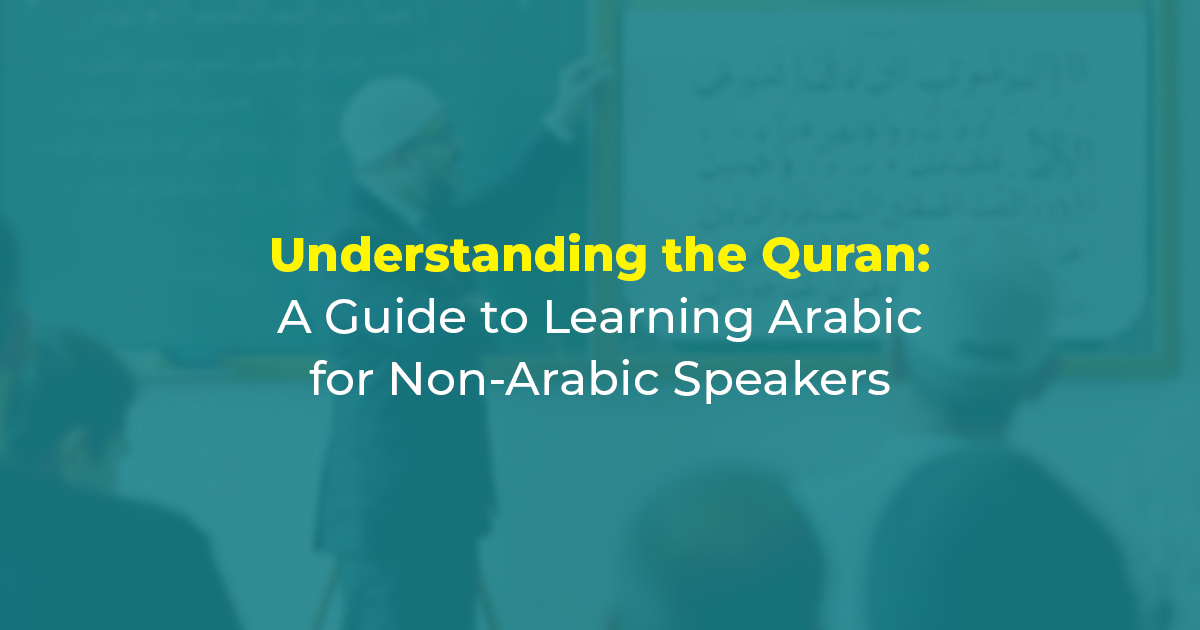Discover the importance of learning Arabic for understanding the Quran. This guide offers practical steps for non-Arabic speakers to begin their journey of learning Arabic, and highlights the benefits of Quranic Arabic.
Have you ever felt like you’re missing out on the true beauty of the Quran? Learning Arabic can unlock a whole new world of understanding, bringing you closer to Allah’s words in their purest form. For non-Arabic speakers, this journey might seem daunting, but it’s a rewarding path that can transform your relationship with the Quran.
At Darussalam, we’re committed to helping you access authentic Islamic knowledge. That’s why we’ve created this guide to learning Quranic Arabic for non-Arabic speakers. Let’s dive in and discover why Arabic is so crucial for understanding the Quran and how you can start your learning journey.
Why Learning Arabic Is Crucial for Understanding the Quran
The Uniqueness of the Quran’s Arabic
The Quran’s Arabic isn’t just any Arabic – it’s a rich, poetic language that carries layers of meaning in every word. When you read the Quran in Arabic, you’re not just reading text; you’re experiencing a divine linguistic miracle.
“Indeed, We have sent it down as an Arabic Quran that you might understand.” (Yusuf [12] : 2)
This verse highlights why Allah chose Arabic for the Quran – for clear understanding. But why is Arabic so special?
- Precise Meanings: Arabic words often have specific, nuanced meanings that can’t be fully captured in other languages.
- Poetic Structure: The Quran’s rhyme and rhythm in Arabic create a beautiful, memorable text that touches the heart.
- Linguistic Miracles: Many scholars point to the Quran’s unique linguistic features as proof of its divine origin.
Nuances Lost in Translation
While translations are helpful, they often can’t capture the full depth of the original Arabic. Here are some examples:
- The word “رحمة” (rahmah) is often translated as “mercy,” but it carries a much broader meaning of compassion, love, and care.
- In Surah Al-Fatihah, “الحمد” (al-hamd) is usually translated as “praise,” but it also includes meanings of gratitude and glorification.
These subtle differences might seem small, but they can significantly impact our understanding and connection with the Quran.
Divine Revelation in Arabic
Allah chose Arabic for the Quran, making it the language of divine revelation. This choice elevates Arabic to a special status in Islamic studies:
- It’s the language of Islamic scholarship throughout history.
- Understanding Arabic allows direct access to a vast wealth of Islamic literature.
- It helps preserve the authentic teachings of Islam across generations.
Remember, learning Arabic for the Quran is a journey, not a destination. It’s about getting closer to Allah’s words, one step at a time.
At Darussalam, we’re here to support you on this beautiful journey. Our collection of Arabic learning resources, Quranic studies materials, and expert guidance can help you unlock the treasures of the Quran in its original language.
The Benefits of Learning Quranic Arabic for Non-Arabic Speakers
Embarking on the journey of learning Quranic Arabic isn’t just about acquiring a new skill – it’s about transforming your relationship with Islam’s holy book and enhancing your spiritual life. Let’s explore the incredible benefits that await non-Arabic speakers who take on this rewarding challenge.
Strengthening Spiritual Connection
Imagine reading the Quran and feeling the weight of each word, understanding the nuances that Allah intended. This is what learning Quranic Arabic can do for your spiritual connection:
- Direct Communication: When you understand Arabic, it’s like Allah is speaking directly to you through the Quran. This immediacy can be profoundly moving and spiritually invigorating.
- Emotional Resonance: The poetic nature of Quranic Arabic often carries emotional undertones that translations might miss. You’ll find yourself more deeply touched by the verses.
- Deeper Reflection: Understanding the original text allows for more meaningful tadabbur (reflection) on the Quranic verses, leading to greater spiritual insights.
“Those who listen to the Word, and follow the best (meaning) in it: those are the ones whom Allah has guided, and those are the ones endued with understanding.” (Quran 39:18)
This verse emphasizes the importance of truly understanding Allah’s words – something that becomes much more achievable when you learn Quranic Arabic.
Improved Focus in Salah (Prayer)
Prayer is a cornerstone of Islamic practice, and learning Quranic Arabic can significantly enhance this crucial aspect of worship:
- Mindful Recitation: When you understand what you’re reciting, your prayers become more focused and meaningful. Each word carries weight and purpose.
- Enhanced Khushu’ (Humility): Comprehending the beautiful words you’re uttering in prayer can increase your sense of humility and presence before Allah.
- Varied Recitations: With Arabic knowledge, you can confidently recite different surahs in your prayers, enriching your spiritual experience.
- Stronger Connection: Understanding the du’as (supplications) and adhkar (remembrances) in their original Arabic form deepens your connection with Allah during prayer times.
Learning Quranic Arabic opens up a world of deeper engagement with the holy book:
- Enhanced Tafsir Studies: When you can read the original text, studying Quranic exegesis (tafsir) becomes much more rewarding. You can appreciate the scholars’ insights at a deeper level.
- Easier Memorization: Understanding the meanings behind the words makes memorizing the Quran easier and more meaningful. You’re not just memorizing sounds, but internalizing divine messages.
- Appreciation of Quranic Miracles: Many linguistic miracles in the Quran become apparent only when you understand Arabic. You’ll discover new layers of amazement in Allah’s words.
- Independent Learning: With Arabic skills, you can explore classical Islamic texts on your own, expanding your knowledge beyond just the Quran.
- Cultural Bridge: Quranic Arabic provides insight into Islamic culture and history, helping you feel more connected to the global Muslim community.
“And We have certainly made the Quran easy for remembrance, so is there any who will remember?” (Quran 54:17)
This verse reminds us that Allah has made the Quran accessible. By learning Arabic, you’re taking a significant step towards fully embracing this divine facilitation.
Learning Quranic Arabic as a non-Arabic speaker is a journey that requires dedication, but the spiritual rewards are immeasurable. It’s about more than just understanding words; it’s about enriching your Islamic practice, deepening your connection with Allah, and unlocking the full beauty of the Quran.
Overcoming Common Challenges for Non-Arabic Speakers
Fear of Difficulty
Learning Quranic Arabic can feel intimidating, but it becomes manageable when broken into simple steps. With dedication and the right resources, anyone can make progress over time.
Lack of Time
Busy schedules aren’t a barrier—short, daily sessions of 10-15 minutes can lead to gradual improvement. Consistency is key, and learning can fit into your daily routine.
Practical Strategies to Learn Arabic
Start by mastering the alphabet and essential Quranic vocabulary. Use apps or enroll in courses for structured learning and steady progress.
Step-by-Step Guide to Learning Arabic for Understanding the Quran
1. Understanding the Goal
- Objective: The main goal is to comprehend the Quran in its original language to gain a deeper understanding of its meanings and teachings.
- Motivation: Keep in mind the spiritual and intellectual rewards of understanding the Quran in its original language.
2. Fundamentals of Arabic
- Alphabet: Start by learning the Arabic alphabet; knowing how to read and write each letter.
- Vowels: Learn the Harakat (short vowels) and other signs such as Sukoon and Shadda.
- Basic Grammar: Focus on basic sentence structures, subject-verb agreement, the gender of nouns, and plurals.
3. Expand Vocabulary
- Quranic Vocabulary: Focus on commonly used words in the Quran. There are books and flashcards available that list these words.
- Root Words: Learn about the root system in Arabic to help you understand the formation of different words from the same root.
4. Learning Grammar in Depth
- Nahw (Syntax): Deepen your understanding of how sentences are formed and how components interact.
- Sarf (Morphology): Study how words are derived from root letters to form verbs, nouns, and particles.
5. Practice Reading
- Script Practice: Read the Quran regularly to familiarize yourself with its script and style.
- Audio Aids: Listen to recitations and try to follow along with a Quran copy to improve pronunciation and comprehension.
6. Use Supplementary Materials
- Tafsir (Exegesis): Study the explanations of Quranic verses by scholars to understand context and interpretations.
- Hadith: Learn sayings of the Prophet Muhammad to see practical applications of Quranic principles.
- Books: Use textbooks and workbooks designed for non-Arabic speakers learning Quranic Arabic.
7. Engage with Teachers and Communities
- Classes: Take structured classes with a knowledgeable teacher, either online or in-person.
- Study Groups: Join study groups where you can practice and learn with peers.
- Language Partners: Pair up with a language partner for regular practice.
8. Consistent Practice and Revision
- Daily Practice: Dedicate a specific time each day for Arabic study.
- Regular Review: Regularly review past lessons to reinforce learning and prevent forgetting.
9. Advanced Studies
- Advanced Texts: Once basic understanding is solid, start studying more advanced grammar and tafsir texts.
- Specialized Courses: Consider courses focusing on classical Arabic poetry or prose to broaden your understanding.
10. Apply Your Knowledge
- Writing and Speaking: Try to write essays or give talks in Quranic Arabic.
- Teaching: Teaching what you’ve learned to others can reinforce your knowledge and help you discover gaps in your understanding.
Patience and persistence are key in learning any language, especially one with the depth and history of Classical Arabic. The process is not just about linguistic skills but also about connecting with the Quran on a spiritual level.
Recommended Resources for Learning Quranic Arabic
Apps for Learning Arabic
Apps like Duolingo and Memrise offer interactive lessons on Quranic Arabic. They provide flexibility for learning basic vocabulary and grammar at your own pace.
Books for Beginners
Books such as “Arabic Through the Quran” and “Madinah Arabic Reader” provide structured learning for beginners. Darussalam offers highly recommended titles such as Arabic Course 1 (English) – Hardcover, which is designed to guide learners step by step through Quranic Arabic, and Modern Arabic Made Easy, a simple yet comprehensive resource for grasping key Arabic phrases and sentences.


Online Courses
Courses like Bayyinah TV or Quranic Arabic Made Easy offer in-depth lessons with interactive exercises. These courses provide structured learning paths, making it easier for non-Arabic speakers to grasp Quranic Arabic.
Study Groups or Communities
Join study groups or online communities for added motivation and peer support. Engaging with others can help maintain consistency and deepen your understanding of Quranic Arabic.
Additional Books from Darussalam
Darussalam UK has several essential resources for Quranic Arabic learners:
- Student’s Guide to Grammar Rules: A practical guide to Arabic grammar, crucial for understanding the structure of Quranic Arabic.

- What is the Holy Quran and How to Recite It: A guide that not only explains what the Quran is but also provides tips on proper recitation, enhancing your connection to the text.

These books, alongside others from Darussalam, offer comprehensive support for anyone beginning their journey in learning Quranic Arabic.
How Long Does It Take to Learn Quranic Arabic?
Learning Quranic Arabic to understand the Quran can vary significantly in duration based on several key factors. Here’s a structured look at what can influence the time it takes:
Prior Knowledge
- With Background in Modern Standard Arabic: You might progress faster due to similarities with Quranic Arabic. Expect 6 months to 1 year of dedicated study for proficiency.
- Starting from Scratch: Without any Arabic background, reaching a comprehensive understanding could take 2 to 5 years, depending on your study habits.
Study Intensity
- Part-Time Learning: Engaging in weekly classes or regular self-study sessions could extend the learning period to 3 to 5 years.
- Full-Time Study: Intensive courses or immersive programs could shorten the timeline to 1 to 2 years.
Learning Goals
- Basic Understanding: Grasping general meanings could take as little as a few months up to a year, especially with supplementary tools like translations.
- Deep Comprehension: Delving into more intricate grammar, vocabulary, and classical commentaries could require several years of focused study.
Method of Study
- Self-Study: Utilizing books, apps, and online resources might be slower without structured guidance, potentially extending the learning period.
- Formal Education: Classroom learning or structured online courses with instructors can provide more consistent progress and clearer benchmarks, enhancing the learning curve.
The time commitment for learning Quranic Arabic is influenced by your starting point, goals, and learning environment. It’s a rewarding endeavour that not only enhances language skills but also deepens religious and cultural understanding. Regular practice and persistence are crucial, regardless of the method or pace of study.
Conclusion
Learning Quranic Arabic is a rewarding journey that can deepen your understanding and connection to the Quran. Starting with basic steps like mastering the alphabet and focusing on Quranic vocabulary makes the process more manageable.
With the help of recommended resources, structured courses, and consistent effort, anyone can learn Quranic Arabic. No matter your current level, taking the first step towards learning Quranic Arabic is a crucial investment in your spiritual growth.
To begin your journey with structured guidance, consider enrolling in the “Learning Arabic Language of the Quran” program or exploring the resources from Darussalam. Start today, and deepen your connection to the Quran by learning its original language





